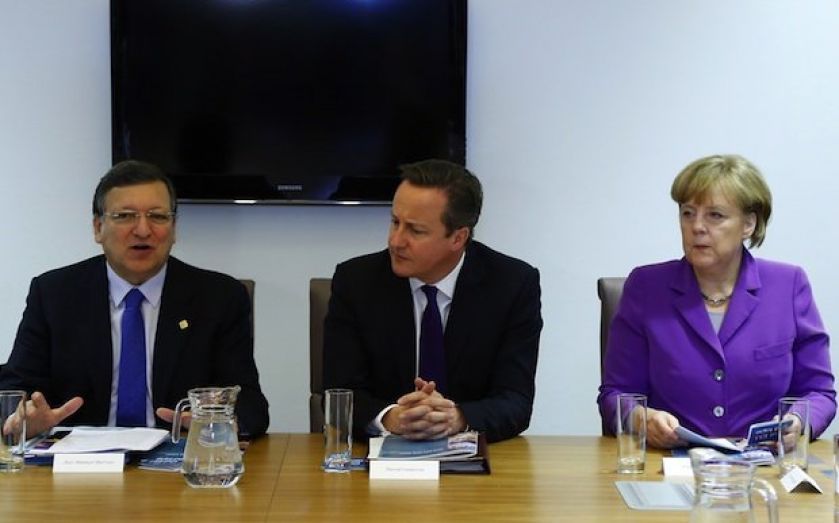Europe ignores its relative decline – the UK could have a different future

A NEW strain of gormlessness is infecting Europe. Despite the temporary distraction of a European Central Bank rate cut, it’s the problems besetting America and the Brics that have been noisily and gleefully recounted in European newspapers on a daily basis.
These difficulties are certainly real, but their prominent coverage belies the intellectual blind alley besetting European analysts. By focusing on other peoples’ problems, Europeans can claim everything is quite ok; as everyone is failing, things are staying the same. And so the continent’s cheerleaders continue to whistle past the graveyard, deluding no one but themselves.
For power, since the days of Pericles, is relative rather than absolute. Unlike the Brics and the US, the Eurozone has yet to return to the level of economic output generated in 2008. Even this hides the extent of Europe’s calamity. The euro crisis has morphed into a chronic ailment, with Italy, Spain, Portugal, and Greece locked in what can only be described as a Depression. Germany is rapidly ageing, with its Statistical Office projecting its population will fall to 65m in 2060 (from 82m in 2008). Energy costs in Germany and Denmark are roughly 300 per cent higher than in the US. This is where the debate about the UK’s future in the EU must start, with a sober reckoning of what Europe’s trajectory looks like.
Militarily, only two European powers – Britain and France – have full spectrum military capabilities. This, given the ongoing existential economic crisis, is highly unlikely to change over the next few decades. While others, like the Dutch, have significant add-on capabilities, none is a major military player amounting to a genuine force multiplier for the UK. The only country with the economic wherewithal to theoretically join the club, Germany, will never do so. A common joke at my political risk firm is that defence spending will always be the sixteenth German priority in any poll – out of 15 choices.
Likewise, the place is a political mess, and will remain so. France and the Latin countries want less austerity and more solidarity, while Germany wants exactly the opposite. The euro-elites are pressing for greater integration, even as the UK wants far less. The French are spending their time trying to derail the ambitious free trade talks with the US, while Berlin (despite Edward Snowden’s phonehacking allegations) is, with the UK, desperate for the talks to succeed. In other words, we couldn’t get the major leaders of Europe to agree on a common ice cream flavour, let alone something important.
Lastly, more than anything else, it is the future health of Europe’s economy that must be gauged. There are only three macroeconomic ways (or a combination thereof) out of the euro mess – predicated as it is on a competitiveness misalignment between north and south. All three are ugly. The first is for debtor countries to leave the euro, externally devalue their currencies, and return to competitiveness. Whatever currency Germany was using would soar, devastating its export-driven economy. The bad feelings that would be bound to politically ensue would hobble Europe, quite possibly forever.
The second is for the debtor states to stay in the euro, and continue with massive internal devaluation by decreasing prices and wages, enduring further wrenching pain, all the while hoping for future gains down the road. It is an open question as to whether there is the political will to do much more of this.
The third is for the debtor states to stay in the euro, and benefit from a significant increase in prices in the euro-core. Goldman Sachs reckons this would amount to Germany enduring rates of inflation 4 to 5 per cent higher than the depressed periphery for a generation. And that just does not sound like a policy any German I know is ever going to embrace.
There is a fourth option, one recognised by historians, if not by Europe’s many cheerleaders: Europe will not solve its basic problems, and will increasingly become less important as time progresses. Given the military, political, and economic tour we’ve just taken, this is by far the likeliest outcome. Historically, states do not always solve their own problems, or we would be living in the world of the Minoans and the Hittites.
Given Europe’s present importance to the UK, David Cameron is quite right to try to coax meaningful reforms out of Angela Merkel. However, given Europe’s likely future unimportance, he should also be minded not to accept a deal that does not significantly change the future trajectory of a Europe presently on course for absolute decline.
Dr John C Hulsman is president and co-founder of John C Hulsman Enterprises (www.john-hulsman.com), a global political risk consultancy. He is a life member of the Council on Foreign Relations, and author of Ethical Realism, The Godfather Doctrine, and Lawrence of Arabia, To Begin the World Over Again.